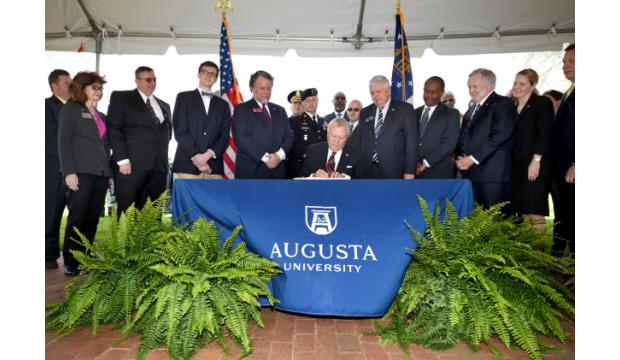
19 Feb 2017 Cyber Center Already Attracting Attention
Before a shovelful of dirt is turned on the project, the Georgia Cyber Innovation and Training Center is attracting industry attention to Augusta and is sparking talk of future collaborations that will transcend traditional boundaries and lead to new and innovative training opportunities, officials said.
Much of that will look to take full advantage of the U.S. Army Cyber Command moving to Fort Gordon in the near future and the unique training opportunities and collaboration opportunities it will afford.
Once the $50 million Georgia Cyber project was announced as part of Gov. Nathan Deal’s amended 2017 budget in January, Walter Sprouse of Augusta Economic Development Authority spread the word about it through the nationwide network of consultants that help companies relocate and expand.
“And the phone started ringing,” he said. Many of the companies are involved in cyber or information technology or related fields, Sprouse said.
“I think these companies are recognizing, if you are in cyber or IT, you’ve got to be here,” he said. “So we’re doing our best to accommodate them.”
Some have even toured the Augusta University Cyber Institute to see what is already here ahead of what will be much greater capabilities and opportunities in the future, said institute director Joanne Sexton.
The new center will have 60,000 to 70,000 square feet for incubator space, and some companies are already inquiring about that, AU President Brooks Keel said. And once the center has decided on a footprint and the land it will need, the rest will be deeded back to the University System of Georgia for AU to begin to plan what else, from academic to private industry, will go on that 17 acres, Keel said. One key aspect of the new center will be its responsibility for providing cyber-training to 85 state agencies, which would essentially create a state-supported mission in Augusta, Keel said.
“There’s not a single agency in the country anymore that doesn’t have some aspect of cyber associated with it,” he said.
Having the large-scale cyber range that can provide real-life training scenarios to face cyber attacks in a safe environment could allow the center to offer training to large “Fortune 500” companies as well as military partners, Keel said.
The current Cyber Institute is already working with military and private industry to get an idea of what their workforce needs are, and that will expand in the new center, Sexton said.
“Part of the concept of this center is we are bringing those parties together,” she said. “And we believe that by doing that we are going to create a resource that helps solve the problem and also really helps industry, helps the government and from an academic standpoint puts in a position where we’re supporting both government and companies with students that are ready to go to work.”
The center is under a “very, very tight timeline” to hire new staff and faculty to be ready when the center opens, Sexton said, which is 18 months after the groundbreaking.
Those cyber efforts will get an additional boost when the 1,200 Army and civilian personnel move to the new Cyber Command headquarters under construction at Fort Gordon, said Col. Todd Turner, garrison commander. That will set up a unique proximity between those in training and those actually working in the field, and the potential for cross-talk, he said.
“What you are learning in the operational force, you can take it right back down to the platform and an instructor can deliver that to students right across the street,” Turner said. “We find a problem over in the operational force, industry and academia over here (at Georgia Cyber) are able to solve it, it feeds right back into our platform, into our students and into our operational force. So we really see great opportunity for synergy here between this facility and Fort Gordon.”
Once Cyber Command moves, the contractors and private industry that help support it are likely to follow, said Scott Poag, project manager for Augusta Economic Development Authority.
“Because the customer is here, the benefit for the companies is the customer is going to be able to give them real-time feedback on, ‘this is what our gaps are,’ so that gives them the edge on that research and development component to help fill those gaps,” he said.
Not only will those companies come but “then you can have additional companies associated with those companies and then the ripple effect extends well beyond this 17 acres” on the Savannah River, Keel said. “That’s the impact we will have on Augusta. Imagine all of the retail, just general retail in (downtown Augusta) that is going to be needed to support employees that are working and living on this 17 acres. The ripple impact is going to be huge for the city.”
Source: The Augusta Chronicle
Author: Tom Corwin/Staff Writer

